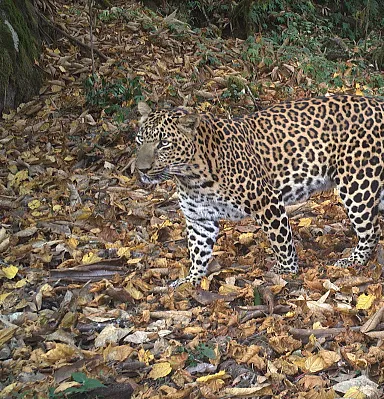
Bhutan Wild Cat Health Project
Monitoring the habitat use and health of wild felids in Bhutan
Research
The Bhutan Wild Cat Health Project is a groundbreaking initiative focused on protecting Bhutan’s nine native wild cat species, ranging from the iconic snow leopard and tiger to the elusive clouded leopard and other small felids. As tourism expands and free-ranging domestic dogs encroach on protected areas, threats to wildlife health and habitat connectivity are on the rise.
- Focus Species: Catopuma temminckii (Asiatic Golden Cat) , Neofelis nebulosa (Clouded Leopard) , Felis chaus (Jungle Cat) , Prionailurus bengalensis (Leopard Cat) , Panthera pardus (Leopard) , Pardofelis marmorata (Marbled Cat) , Otocolobus manul (Pallas’s Cat) , Uncia uncia (Snow Leopard) , Panthera tigris (Tiger)
- Location: Bhutan, specifically four focal study areas: Jigme Dorji National Park, Wangchuck Centennial National Park, Jigme Singye Wangchuck National Park, and the Thimpu Forest Division
- Project Status: Ongoing
- Project Start: 2025
Help us continue to fund projects like this one:
Objectives
Project Goals:
- Measure the influence of human activity and domestic dogs on wild felid activity: Using camera traps, we will collect baseline animal presence data to quantify the impacts of domestic dogs and humans on wild felids across Bhutan’s four largest natural areas. This will allow us to model the influence of human- and environmental-related factors that may influence wild felid occurrence across our study areas while also highlighting areas where dog presence is highest.
- Assess the Risk of Disease Exposure: Measure wild felid population health through collection of fecal samples throughout our study areas. Analysis of scat for parasites and diseases of interest will allow us to identify the regions where the risk of transmission from domestic dogs is greater.
- Foster public awareness about the link between wildlife and human health: Collaborate with community leaders, government officials, and local outfitters to develop and distribute educational materials highlighting the link between ecosystem and human health. We will also share information on best practices for viewing wildlife and how to minimize negative impacts on wildlife through interactions with feral domestic dogs.
OUR METHODS
- Camera Traps: We will deploy 400 camera traps across our four focal study areas, collecting data 24/7 about wild felid presence, while also collecting data on human and dog presence. Camera trap images will be used to create detection histories for each wild felid species and these data will be used in subsequent statistical analyses.
- Scat Surveys: Within each study area, we will survey transects for scat from wild felids. Scat samples will be located with the use of a specially-trained scent detection dog. Following the field survey, samples will be sent to various laboratories for analysis to quantify parasite levels, and DNA will also be extracted to confirm species ID for each sample. Samples will be specifically analyzed for exposure to diseases carried by domestic dogs, such as canine distemper virus, rabies, parvovirus, and leptospirosis, as well as toxoplasmosis, which is one of the most common zoonosis in the world. Finally, we will measure the stress hormone levels (cortisol) to assess if wild felids are facing high levels of stress in areas closer to human settlements or where human or dog presence is greater. Chronically-high cortisol levels are associated with compromised immune health.
WHY THIS PROJECT MATTERS
Bhutan is a biodiversity hotspot, particularly for wild felids, several of which are globally threatened with extinction. We will carry out the first large-scale 24-month camera trap survey to assess nine felid species, and the first fecal survey using a scent detection dog.
Importantly, our data collection will span four of the country’s largest protected areas. This will provide crucial baseline data about the distribution of wild felid species in Bhutan, and how species presence and health are affected by free-ranging domestic dogs and tourism.
Our study will also inform future dog vaccination efforts. Even among the dogs with owners, vaccination is not practiced by all. By identifying areas where disease risk is greater, our data will inform Bhutan’s national dog population management strategy.
Community outreach is a critical part of conservation. Our team will collaborate with local partners to produce impactful outreach and education programs on how to minimize negative impacts on species, including felids, through interactions with feral domestic dogs.
As one of the fastest-growing economies in South Asia, tourism to Bhutan’s national parks is quickly rising, which may also facilitate encroachment of domestic dogs on wildlife habitat and risk of disease transmission. By monitoring wild felid activity and health, particularly relative to human encroachment and interactions with domestic animals, our project will produce valuable insights to inform Bhutan's conservation strategies for its threatened wild felids.
PROJECT PARTNERS
The Project Team includes partners and researchers from Felidae, Bhutan’s Ministry of Energy and Natural Resources, Bhutan’s Nature Conservation Division - Department of Forests and Parks Service, Bhutan Ecological Society, Utah State University, multiple university lab partners in the US/Thailand/Bhutan, Zywie Partners LLC, and multiple private donors.
